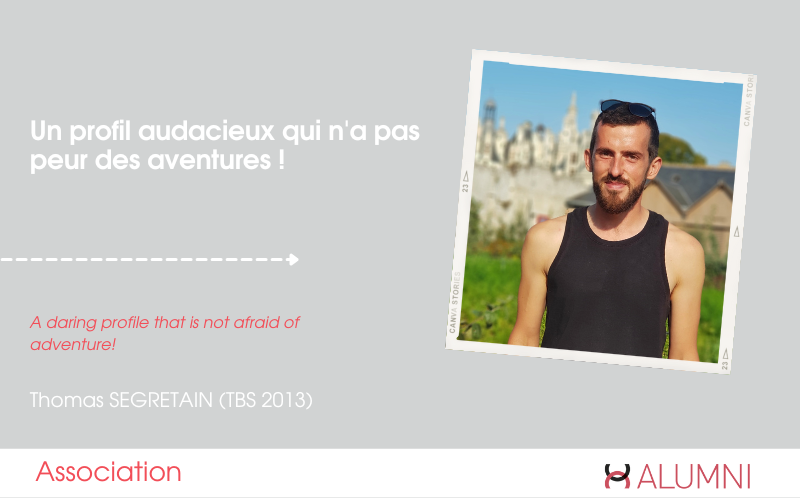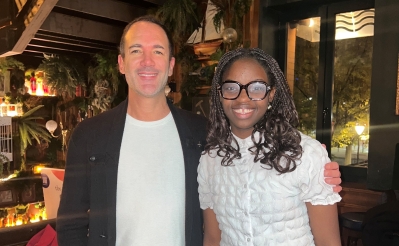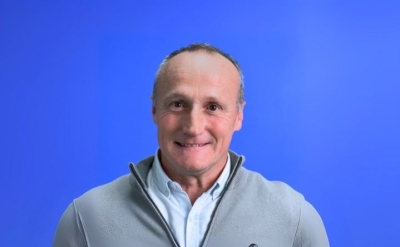News

A daring profile that is not afraid of adventure!
Find below the journey of our Alumni Thomas SEGRETAIN!
1. Can you introduce yourself in a few words?
My name is Thomas SEGRETAIN, I am 33 years old and I am a PGE 2013 Alumni. I live in Blois in the Centre-Val de Loire region, 1.5 hours south of Paris.
Since 2018, I have been undergoing a professional reconversion after going back to school to train, and having lived three seasons as a market gardener in Chambord.
For 2023, my goal is to create and test a new profession inspired by han-nō han-X (Japanese): to be half farmer, half something else (X): I realized that I needed to produce healthy food, to have my hands in the ground, as much as to continue to live and accompany entrepreneurial projects. A hybrid in the end.
2. You are a gardener at the Domaine de Chambord and also a freelancer in the field of training and coaching. Can you quickly explain what made you decide to launch yourself in these two fields?
After a few years in sales (Danone, Amazon and then Famoco, an IT startup), my girlfriend and I decided to go on a long trip for 15 months (see below). When we came back, we said to ourselves that we wanted to do something else with our lives.
We had the feeling that we had reached a kind of ceiling in Paris, as for the way of life to which we aspired: we were cooking
We were cooking organic and vegetarian, we had a vermicompost, we were cycling, we were attending Kaizen conferences and we were drinking at the Ressourcerie... But we were still hearing wrong notes in our score!
Both of us, we reconverted: my friend, in cooking and me in the agricultural field to learn the job of market gardener (child of the city, I did not know how to grow radishes).
Each of us, on our own, went on to work for a company to gain experience.
I had the incredible opportunity to join the creation and implementation of the Jardins-Potagers de Chambord: in addition to a unique opportunity to learn this new trade, I was able to use the skills from my "previous life" and feed my appetite for entrepreneurship.
After 3 seasons, as rich as they were trying, I decided to leave the adventure to devote myself to other aspirations: to be able to transmit, experiment and produce independently...
PS: to reassure you, even if you leave to grow vegetables in the country, you never stop to tune a score 😉
3. You have completed a trip around the world, what was your journey and motivations for this trip.
We traveled for 5 ½ months in South East Asia, 2 ½ months in South Africa and 7 ½ months in South America.
My friend and I were already keen on traveling and discovering new things: as a proof, as an expatriate in Vietnam, I had to move a dozen times before entering TBS Education.
As for my friend: to reach the campus of her school in Shanghai, she decided to go there by... Transsiberian train!
This project was hibernating in all of us, and as soon as we started working, we saved up to finance this trip. We said to ourselves: once the amount is reached, we leave!
We wanted to discover a new part of our world, together, and "take the time to take the time".
Without any particular red thread, we took 15 months to do what we wanted, when we wanted. We had to make choices, of course, but we never felt so free.
We were able to live several experiences that fed our reflections about the rest of the journey, including one that transformed me personally: 2 weeks of volunteering in a self-sufficient farm in the middle of the Karoo Mountains, in South Africa.
For the meals, we simply helped ourselves in the vegetable garden! WHAT ?! We can produce and feed ourselves entirely from a vegetable garden?!
4. During your trip, you had to face difficulties, situations where you had to adapt. What anecdote could you tell us?
There are often difficulties and inconveniences when traveling. As time went by, we became more and more patient, understanding and resourceful!
I would like to share with you a little anecdote that touches me. Our parents came to visit us in Peru and this story resurfaces every time we meet.
We had negotiated with our respective families that, if they joined us, the trip would be done in "backpacker" mode, youth hostel, collectivos and tutti quanti...
Together, we joined Huaraz and the Cordillera Blanca (the central part of the Peruvian Andes). Our host proposed us a nice little trek to get in condition, in particular to better manage the soroche (mountain sickness). We left to conquer the laguna Wilcacocha, which is at 3 700 meters of altitude. The way? A difference in level of 577 meters on 3.5 kilometers.
The first 50 meters were very pleasant, with a rather soft slope. After a small bend in the road, a rocky path appears in front of us.
The lack of oxygen starts to be felt while we are only at 3 200 meters of altitude. But what a landscape! The nature is really exceptional.
After one hour of walking, we meet a small lady sitting, in the shade, at the foot of her house built with earth and straw. Her grandchildren are running and playing without showing any sign of breathlessness. We ask her for directions to the lagoon.
She simply replies, "Está my cerca, ves el último arbol, allí es" (it's very close, you can see the last tree up there, it's over there).
My father looks for the tree in question, following the path she points out to us.
And there misfortune!
In a second, we find ourselves in the world of the lilliputians.
We had not yet made half of the way. My parents, smokers, didn't know how many cubic meters of air they would have to suck in to supply their blood with oxygen.
They were desperately looking for a donkey, but no, we were alone and we had to climb with our little legs to reach this famous "último arbol". 1 hour and a half later, we finally arrived at the edge of this small lagoon.
Eureka! The consecration, the Graal.
What a reward: a landscape of dream, as in the reports! The view on the Cordillera Blanca and its snowy peaks is splendid. This succession of peaks culminating at more than 6 000 meters of altitude is impressive.
What I draw from this anecdote? The fact that we are all capable of accomplishing what we didn't know was possible!
It's getting a bit old, but we had recounted our epics on a blog: https://tomateetcamomille.wordpress.com/
5. You studied at TBS Education, what aspects did you develop during your school career that still serve you today?
At the time, I had chosen to follow the "Sales" and "Entrepreneurship" options, then to spend my last year in a double degree in the United States (MBA for 1 ½ years). In parallel to my studies, I have always been involved in the associative life (arts offices, management of the eligible and TBS Alumni).
All these experiences have obviously nourished me a lot!
Where I benefit the most is probably in using my skills and all the tools I have learned in a field of activity that needs it a lot: agriculture.
I am animated by the following question: how to help farmers, project owners and individuals to make better decisions regarding production, with the objective of resilience and autonomy (especially in terms of decision-making)?
6. You also play a role in volunteering, in which associations do you volunteer today? How important do you think it is to be involved in associations?
My last business school experience was managing the Paris Chapter for TBS Alumni, but that's getting old!
Today, I am on the board of directors of ADDEAR (Association Départementale pour le Développement de l'Emploi Agricole et Rural) and of the ecolieu de la Filerie (an association that works on the ecological transition).
I am a fervent believer in the power of networks and exchange.
From a political, even philosophical point of view, the associative life is an essential lever to compensate the preponderant weight of the capitalist world of our societies: it is difficult to militate, together, when one must make an accounting profit or distribute dividends.
I find in the associative world a way to act differently, on subjects that we cannot necessarily make a profession out of.
7. Do you have a mantra?
For a long time, I used to quote a mantra stolen from the American soccer team at the university where I studied
I was studying: "Never Yield" but I decided to change!
"Whatever you dream of undertaking, start it. Boldness has genius, power, magic." From Johann Wolfgang von Goethe
8. And finally, do you have a last word for our readers?
I invite all the readers who have questions to take the courage to answer them (as a reminder, the answer is the reason to live a question).
We are fortunate to live in a country that allows us to not get stuck in a box and explore, so let's seize these opportunities!
I have already accompanied several Alumni in their transition process, simply by exchanging, and I am happy to continue!
PS: if you contact me, you are already more ready than you think!
You must be logged in and a member* to contact Thomas SEGRETAIN (TBS 2013)
* TBS Alumni graduates from the 2017 and earlier classes are required to pay a lifetime subscription to benefit from all our services. To find out more
Other members are invited to demonstrate their spirit of solidarity by becoming a Donor Member of the TBS Foundation. To find out more, click here















No comment
Log in to post comment. Log in.